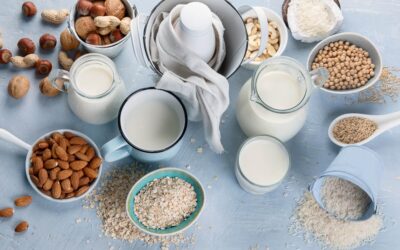According to the National Osteoporosis Foundation, approximately 10 million Americans suffer from osteoporosis and another 44 million have been diagnosed with low bone density.1 Milk has often been purported to “build strong bones” a myth that remains pervasive today thanks to aggressive marketing by the dairy industry. The truth is humans do not need cows’ milk to build strong bones and we are probably better off without it.
In multiple comprehensive large-scale investigations, researchers found no relationship between increased milk consumption and reduced bone fracture risk.2,3 In fact, a large Swedish investigation examining 100,000 individuals over 20 years found women (but not men) drinking three glasses or more of milk had an increased risk of bone and hip fractures.4 Additionally, they found higher risks of dying from heart disease and cancer and a higher rate of death among both men and women. They aren’t the only ones to find an increased risk of fractures among individuals consuming milk.2 There is plenty of evidence refuting the necessity of dairy in your diet, but we still need more studies (particularly randomized control trials) to gain a more thorough understanding of nutrition and bone health.
Regardless, dairy won’t save you from brittle bones, but a healthy, active, dairy-free lifestyle certainly can help! Follow these 5 tips below to build and maintain strong bones—because no one wants to stop playing just because they get older.
1. Incorporate Regular Weight-Bearing Exercise
Like any other cell in your body, your bone tissue is continuously being broken down and built back up. This is a process known as bone remodeling. However, as we age (around 40 years old), we begin to experience an imbalance in bone remodeling leading to a loss of bone density and an increased risk of fractures.
Mechanical stress, in the form of weight-bearing exercise, put force on your bones stimulating those specialized cells to maintain your bone’s strength and remodeling processes. Did you know astronauts have to intentionally exercise at least two hours per day while in space to preserve their bone mass? Without the continual force of gravity pushing on their muscles and bones like on Earth, their bones can quickly lose density at a rate up to 12 times faster than on Earth.5 You don’t have to be an astronaut to understand the importance of gravitational force. To maintain strong, healthy bones, practice some form of weight-bearing exercise (activities that support your own weight, thanks to gravity) regularly, or about 30-60 minutes five days per week. Weight-bearing is anything that incorporates force, so think running, walking, tennis, rock climbing, dancing, and bodyweight exercises (lunges, squats, push-ups, etc).6 To a lesser extent, water aerobic exercises may be helpful as well.7
2. Eat Calcium From Plant-Based Sources
The dairy industry has drilled Americans on the importance of strong bones for over a century. We grow up getting brain-washed into believing that milk was the only substance that builds strong bones. But most people don’t realize that it is the calcium in milk that provides benefits to bone health. Cow’s milk will not prevent osteoporosis, nor it is the only form of dietary calcium. In fact, some studies have found it to be less bioavailable than many plant sources, meaning your body cannot absorb as much of what you consume8. Boiled brussels sprouts, for example, are twice as bioavailable as dairy products! Dark leafy greens (kale, bok choy, broccoli, collard greens, etc), nuts and seeds, soy milk, and a variety of beans all contain high amounts of bioavailable calcium as well. Looking to dip your veggies in something? Tahini is high in calcium and makes a great dip for carrot sticks, cucumber slices, or drizzled over a salad or grain bowl.

Dr. T. Colin Campbell, respected researcher and author of The China Study, has also pointed out, “vegetables contain boron, a mineral that helps keep calcium in the bones. Milk contains virtually none.” 9,10 So if you’re eating a varied diet full of plants, you’re probably getting enough calcium.
On the other hand, evidence for calcium supplementation and bone health has been inconsistent at best.11 Some studies have even found an increase in risk of certain chronic diseases. It’s probably better for you to eat most of your calcium rather than relying on supplementation. However, for those males and females wishing to supplement, you should aim for around 1,300 milligrams per day according to the Institute of Medicine of the National Academies.12 Make sure to always check with your healthcare provider first!
3. Vary Your Exercise
If your favorite activity is not considered weight-bearing (such as cycling, swimming, rowing, chair aerobics, etc), it is essential to cross-train to still get that important force on your bones. This doesn’t have to be intense—especially if you’re putting in hard workouts in your primary sport—but you should have a plan in place. When you add additional weight and impact, you’re upping the force placed on your bones, leading to enhanced remodeling. Strong muscles also help prevent the risk of a bone-shattering fall by giving you better balance and the ability to catch yourself if you do slip or start to fall. Pick up some dumbbells or a barbell, go for a light jog, or do a few sets of something like jump squats. Find an activity you enjoy and add it to your routine, because there’s no doubt you’ll want to be cycling with strong muscles and dense bones well into your senior years.

Kettlebells are a great addition to your routine.
4. Soak in the Vitamin D (or Take a Supplement)
Vitamin D is essential to bone health because it helps the body absorb calcium more efficiently and supports strong muscles. Despite dairy industry claims, cows’ milk does not naturally contain vitamin D. When the carton says it contains vitamin D, it’s because it’s fortified.
Dr. Milton Mills, MD, has said that drinking cows’ milk for its calcium or vitamin D content is like smoking a cigarette for oxygen—it just doesn’t make sense, and there are better options out there without the negative consequences.
The most natural way to obtain this nutrient is from the sun—when exposed to enough strong sunlight, our body can manufacture its own vitamin D. However, those who are pigmented, living in colder climates, or are not able to spend 10-30 minutes in the midday sun, need to look to other sources. Many plant milks are now fortified with vitamin D, making it even easier to get through your diet. We suggest getting a blood test and discussing your level with your healthcare provider if you are concerned.
5. Don’t forget about these essential nutrients
Calcium and Vitamin D are most often promoted regarding osteoporosis prevention and bone health, but they are not the only vitamins that support your skeletal system. Boron, vitamin K, and magnesium are also essential.13 All of these nutrients are widely available in plant-based foods. Find boron in prunes, dried apricots, raisins, and avocados; vitamin K in brussels sprouts, prunes, and dark leafy greens; Vitamin C in citrus fruits, tomatoes, and peppers; potassium in oranges, bananas, and other fruits and vegetables; magnesium in nuts, brown rice, kidney beans, and lentils. A recent cross-sectional study found older adults eating healthier plant based foods and less animal products to have a lower risk of osteoporosis.14 When you consume a varied diet full of plants—instead of relying on a single source of nutrition as the dairy industry advises—you are far more likely to meet your nutritional needs and build your healthiest self.

Medical reviewed by Dr. Lucky (Lakshman Mulpuri MD)
References →
- Osteoporosis Fast Facts. https://www.bonehealthandosteoporosis.org/wp-content/uploads/2015/12/Osteoporosis-Fast-Facts.pdf
- Bian S, Hu J, Zhang K, Wang Y, Yu M, Ma J. Dairy product consumption and risk of hip fracture: a systematic review and meta-analysis. BMC Public Health. Jan 22 2018;18(1):165. doi:10.1186/s12889-018-5041-5
- Malmir H, Larijani B, Esmaillzadeh A. Consumption of milk and dairy products and risk of osteoporosis and hip fracture: a systematic review and Meta-analysis. Crit Rev Food Sci Nutr. 2020;60(10):1722-1737. doi:10.1080/10408398.2019.1590800
- Michaëlsson K, Wolk A, Langenskiöld S, et al. Milk intake and risk of mortality and fractures in women and men: cohort studies. Bmj. Oct 28 2014;349:g6015. doi:10.1136/bmj.g6015
- Malik T. Space Station Astronauts Lose Bone Strength Fast. https://www.space.com/6354-space-station-astronauts-lose-bone-strength-fast.html
- Benedetti MG, Furlini G, Zati A, Letizia Mauro G. The Effectiveness of Physical Exercise on Bone Density in Osteoporotic Patients. Biomed Res Int. 2018;2018:4840531. doi:10.1155/2018/4840531
- Simas V, Hing W, Pope R, Climstein M. Effects of water-based exercise on bone health of middle-aged and older adults: a systematic review and meta-analysis. Open Access J Sports Med. 2017;8:39-60. doi:10.2147/oajsm.S129182
- Shkembi B, Huppertz T. Calcium Absorption from Food Products: Food Matrix Effects. Nutrients. Dec 30 2021;14(1)doi:10.3390/nu14010180
- Pizzorno L. Nothing Boring About Boron. Integr Med (Encinitas). Aug 2015;14(4):35-48.
- Campbell TC. China Report: Osteoporosis. https://nutritionstudies.org/china-report-osteoporosis/
- Morelli MB, Santulli G, Gambardella J. Calcium supplements: Good for the bone, bad for the heart? A systematic updated appraisal. Atherosclerosis. Mar 2020;296:68-73. doi:10.1016/j.atherosclerosis.2020.01.008
- Plantz MA BK. Dietary Calcium. StatPearls. 2022;
- Price CT, Langford JR, Liporace FA. Essential Nutrients for Bone Health and a Review of their Availability in the Average North American Diet. Open Orthop J. 2012;6:143-9. doi:10.2174/1874325001206010143
- Hu J, Li Y, Wang Z, et al. Association of plant-based dietary patterns with the risk of osteoporosis in community-dwelling adults over 60 years: a cross-sectional study. Osteoporos Int. 2023/05// 2023;34(5):915-923. doi:10.1007/s00198-023-06700-2








